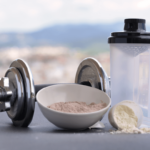Let’s start with some facts… Protein plays a crucial role in providing the necessary building blocks for muscle growth and repair.
The question is how much protein do we need to build muscle?
Is there an optimal type of protein? And does the timing of protein intake make a difference?
In this article, we’ll dive into the science behind these questions. I’ll provide you with evidence-based insights to help you make informed decisions. You’ll learn about protein intake for muscle building and supporting general lean mass gain.
Whether you’re a strength athlete, or you just want to follow a healthy diet, you’ll learn everything you need to know about protein here…
Jump to:
- How much protein to build muscle?
- Does the type of protein affect muscle building?
- Does protein timing matter for muscle building?
- Can you eat less protein if you lift harder?
- Can you have too much protein?
- Are protein supplements better than food based protein?
- How do I factor protein into my macros?
- Should I eat my protein in one go, or several meals?
- Why is protein important?
How much protein to build muscle?
The amount of protein you need to build muscle can vary based on factors such as your age, gender, activity level, and overall goals.
Active people need higher protein intakes to support increased activity and strength training.
During particularly intense periods of training, protein intake takes on an even greater role. It helps to build lean body mass. It helps to repair tissues damaged by exercise. It helps us to feel full when eating reduced calories. It also acts as a secondary energy source through a process called gluconeogenesis.
For these reasons, researchers and coaches recommend a high protein diet.
In a 2017 paper titled International Society of Sports Nutrition Position Stand: protein and exercise, the ISSN states…
‘Higher protein intakes (2.3-3.1 g/kg/d) may be needed to maximize the retention of lean body mass in resistance-trained subjects during hypocaloric periods.’
Hypocaloric periods refer to periods when we’re consuming a calorie deficit. The ISSN work suggests that to maintain muscle mass when we’re dieting, we need higher protein intake. Just like calorie requirements differ depending on body composition, there’s evidence that the same is true with protein.
A recommended guideline for most exercisers is to aim for 1.2 to 2.0 grams of protein per kilogram of body weight per day. This is for individuals engaging in resistance training to build muscle.
This range provides an adequate amount of protein to support muscle protein synthesis and recovery.
Does the type of protein affect muscle building?
I’ll start this section by saying this is a report on the science, not the morality of the subject.
Animal sources of protein are more hypertrophic than plant-based proteins. They’re complete proteins, meaning they contain a complete amino acid profile.
In a 2021 meta analysis titled Animal Protein versus Plant Protein in Supporting Lean Mass and Muscle Strength: A Systematic Review and Meta-Analysis of Randomized Controlled Trials, 16 studies were analyzed. The researchers concluded that…
‘animal protein tends to be more beneficial for lean mass than plant protein, especially in younger adults.’
Different protein sources offer different amino acid profiles. These are the building blocks of protein. Most studies suggest meat, eggs, and dairy products promote greater muscle protein synthesis. This is when compared to plant-based protein. The impact on muscle growth appears to be small.
The key is to have a diverse diet that includes a mix of protein sources. This ensures you’re getting a wide array of essential amino acids. Vegetarians and vegans are still capable of building muscle. They just need to consume enough high quality protein from plant sources.
The ultimate goal should be to avoid a protein deficiency, regardless of how you do it.
Does protein timing matter for muscle building?
Conflicting opinions with regards to nutrient timing have been shared. Some people advocate the use of the ‘anabolic window’ immediately post training. Others have suggested that pre-training protein consumption is more effective.
Again, we’ll share what the science suggests…
Several studies have shown that consumption of protein and/or essential amino acids and carbohydrate in the short period of time after training can increase muscle protein synthesis and suppress muscle protein breakdown.
One study that agrees with the concept of a post-training anabolic window was performed by Levenhagen et al. They published research titled ‘Post exercise nutrient intake timing in humans is critical to recovery of leg glucose and protein homeostasis‘, and they found that…
‘EARLY postexercise ingestion of a nutrient supplement enhances accretion of whole body and leg protein. This suggests a common mechanism of exercise-induced insulin action.’
There’s also research to the contrary though…
Tipton et al performed a study titled ‘Timing of amino acid-carbohydrate ingestion alters anabolic response of muscle to resistance exercise’. They concluded…
‘…results indicate that the response of net muscle protein synthesis to consumption of an EAC solution immediately before resistance exercise is greater than that when the solution is consumed after exercise, primarily because of an increase in muscle protein synthesis as a result of increased delivery of amino acids to the leg.’
What this suggests is that both can be effective. Therefore experiment on yourself and find what works best for you.

Can you eat less protein if you lift harder?
Engaging in more intense weightlifting or resistance training will increase your protein needs. This is to support muscle repair and growth.
In their study titled ‘Food intake, nitrogen and energy balance in Polish weight lifters, during a training camp‘, Celejowa et al showed that 5 out of 10 competitive weightlifters achieved a negative nitrogen balance over the course of a training camp. This is despite consuming an average protein intake of 2 g/kg. It suggests during intense periods of resistance training, protein requirements will actually increase.
Strive for an appropriate protein intake based on your body weight and activity level. If you follow the guidelines, your daily protein intake should be more towards 2 grams of protein per pound of body mass.
Ideally you would do this via animal based foods such as lean meat, fish and eggs, or protein supplementation if needs be. Ideal supplements include whey protein, casein, or for vegans, plant-based proteins.
Can you have too much protein?
Dietary protein is essential for muscle growth. Consuming excessive amounts does not translate to more muscle though.
The excess protein is converted into energy or stored as fat.
Very high protein intake over prolonged periods may stress the kidneys. It can potentially lead to other health concerns too. It’s important to strike a balance and avoid extremes in your protein consumption.
There’s a suggestion that excess protein consumed over a long period of time can create health risks such as kidney disease. The research isn’t particularly clear. It doesn’t suggest a point at which protein consumption becomes dangerous. It also can’t tell us conclusively that high protein consumption is solely responsible for the issues.
Despite that, it would be unwise to exceed the guidelines in place for daily protein consumption for active individuals. For most people, excessive protein intake would be 5g+ of protein per pound of bodyweight.

Are protein supplements better than food based protein?
Whole food sources of protein are generally preferred over supplements. This is because they come with additional nutrients and fibers. There’s no doubt they’re better for health, but there doesn’t appear to be a significant difference in their muscle-building abilities.
Protein supplements can be convenient for meeting your protein goals. This is especially true if you have a busy lifestyle. Whey protein, casein, and plant-based options like pea and rice protein are the most common choices. They can be taken quickly and easily as a protein shake.
For vegans in particular, protein supplementation might be the easiest and most effective way for them to achieve their daily protein target. The reality is it’s more difficult for people following plant-based diets to consume enough grams per day of protein compared to meat eaters and even vegetarians.
Many people consume extra protein in the form of a protein bar. Those following a strict diet need to be aware of the grams of sugar in them. You can easily go over your daily caloric intake requirements if you’re not careful!
Supplements can be a valuable tool. They shouldn’t replace a well-rounded and balanced diet though.
How do I factor protein into my macros?
To calculate your protein needs, multiply your body weight in kilograms by the recommended protein intake range (1.2 to 2.0 grams per pound). This will give you a range of protein grams to aim for daily. Remember to adjust your protein intake based on your activity level and goals.
If you are in an intense period of resistance training, you might want to nudge the protein intake higher.
Your protein intake could be around 50% of your daily calorie intake based on the figures quoted in this article. The daily intake has to be high for anyone looking to improve their body composition by adding more lean body mass.
To add more muscle mass, you need to consume more protein per day – it’s a simple equation.
Should I eat my protein in one go, or several meals?
The distribution of protein intake throughout the day appears to hold a lot of significance when it comes to muscle gain.
In 2014, a study titled ‘Dietary Protein Distribution Positively Influences 24-h Muscle Protein Synthesis in Healthy Adults’ was performed by Mamerow et al.
In the study, they compared a diet where protein intake was spread evenly throughout the day, with a diet where protein was skewed towards a higher intake later in the day. The amounts of protein were the same for both diets. They concluded that…
‘The consumption of a moderate amount of protein at each meal stimulated 24-h muscle protein synthesis more effectively than skewing protein intake toward the evening meal.’
These results suggest that frequent (3 or more) meals containing protein is a better way to eat. Especially when it comes to muscle building and maintenance of lean body mass. Several meals with a moderate protein content are more effective than one larger meal containing a lot of protein.
Distributing protein intake across several meals is more beneficial for muscle protein synthesis. This is compared to consuming a large amount in one sitting. Aim to include a source of protein in each meal and snack. This ensures a steady supply of amino acids to your muscles throughout the day.
Why is protein important?
Protein has been synonymous with the bodybuilding and athletic performance worlds. In reality it’s important for everyone, from the average person to the physique athlete.
All healthy individuals should be consuming adequate protein. It prevents muscle breakdown and allows repair of body tissues. It also contributes towards our daily allowance of calories. Whilst we don’t all need protein supplementation into our diets, protein deficiency can lead to adverse health effects.
Healthy people need to prioritize protein in their diet. Anyone trying to achieve fitness goals or reduce their body weight should be doing the same. A high protein diet helps us stick to a calorie deficit because it keeps us fuller, for longer.
By following the advice in this article, you’ll hit your daily protein target. You’ll also know exactly how much protein you’ll need to build muscle.














